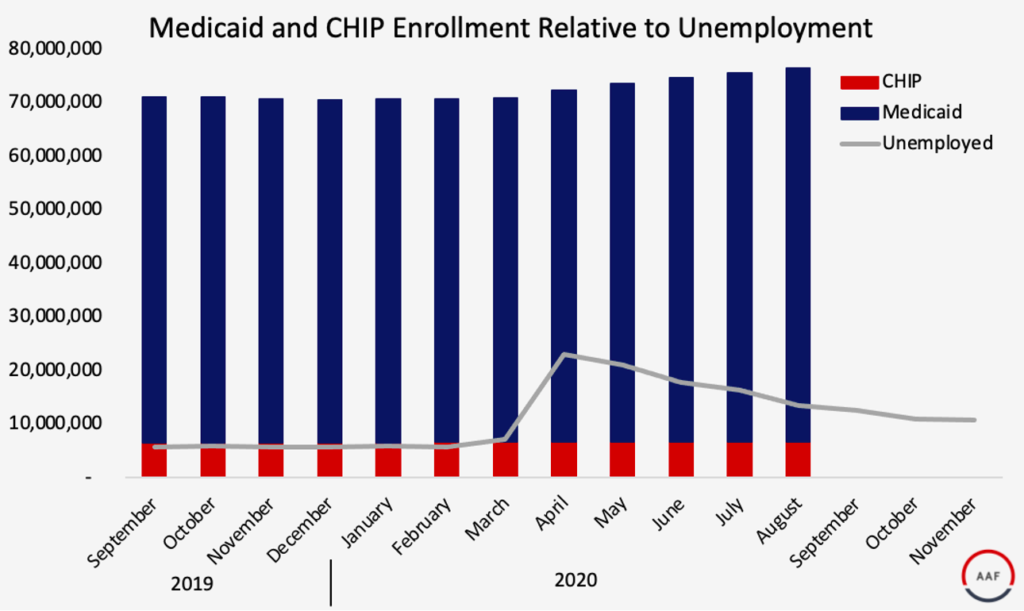Weekly Checkup
January 8, 2021
What Georgia—and the Riot at the Capitol—Mean for Health Policy
This week, unbelievably considering the results in Georgia, the only thing that anyone will be talking about is the travesty that unfolded at the Capitol. American citizens stormed the seat of self-government in an attempt to block Congress from carrying out its constitutionally prescribed duty to certify the results of what Trump’s own Department of Homeland Security has called the most secure election in U.S. history. But while the disgrace we witnessed at the Capitol is by far the most historically significant event of the week, the Democratic sweep of the Georgia Senate runoffs will reverberate much more powerfully on the policy landscape during the 117th Congress. Let’s consider what the results from Georgia mean for health policy.
It’s easy to overstate the impact of a 50/50 Democratic Senate majority. Even if one assumes that Senate Democrats do away with the filibuster—at least in its current form—moving major pieces of legislation, health-related or otherwise, will likely require at least some bipartisan support. Drafting legislation that can pass the more progressive House while passing muster for Senators as different as Bernie Sanders and Joe Manchin will be a herculean task for Senate and House leadership. And if by chance the filibuster remains in place, using the budget reconciliation process would be exponentially more difficult and constraining.
So no, Democrats are not likely to enact Medicare for All in the 117th Congress, budgetary shenanigans in the House aside. Even a federally financed public option may be a bridge too far. But it’s safe to say that the Biden Administration’s ability to enact and implement its health policy agenda just got measurably easier. For one thing, Biden’s nominees just saw their confirmation path cleared. Biden will not have to negotiate with Senate Republicans over his picks; Democrats with Vice President-elect Harris presiding will be able to unilaterally install Biden’s government.
Second, most health policy is still likely to come through the administrative and regulatory pipeline given the slim Senate majority, the number of Trump Administration executive actions Biden will likely want to roll back, and the slow pace of legislative action. But Senate control is important because the Majority Leader has near total control in today’s Senate over what comes to the floor for consideration. Mitch McConnell as Majority Leader could have prevented floor consideration of legislation that may well have garnered enough Republican support to pass, but that was broadly distasteful to most Republicans. For example, there has been growing support among Republicans in the Trump era to let Medicare “negotiate” drug prices, and this and other pharmaceutical-related policies that Democrats have long sought might have enough Republican support to squeak through if brought to the floor.
Third, back on the regulatory front, the Biden Administration will not have to worry about aggressive oversight from Republican-chaired Senate committees with jurisdiction over health policy, particularly as Biden Administration officials work to undo Trump Administration rules around the Affordable Care Act. Instead, those officials will have ready allies tasked with reviewing and overseeing their regulatory actions. The demands of congressional oversight hearings can be taxing and impede agency work. That will no longer be a concern.
It’s also conceivable that in the aftermath of Wednesday’s stunning disgrace, there will be a period (albeit a brief one) of comity in the early days of the Biden Administration as members on both sides of the aisle try to set a less apocalyptic tone. The short-term effect of this week could be a bipartisan desire to quickly and smoothly establish the legitimacy of the Biden Administration, which at a minimum could further grease the confirmation skids.
The temptation will be to either overstate or understate the implications of the Democratic control of the Senate. There is no question the results in Georgia have expanded the Biden Administration’s opportunities to enact its desired health policies. At the same time, such a slim majority will be hard pressed to deliver the transformative health policies that conservatives fear and progressives expect.
Chart Review: Medicaid Enrollment and Unemployment
Tara O’Neill Hayes, Director of Human Welfare Policy
The chart below shows that Medicaid enrollment continued to increase throughout the summer last year even while the official number of unemployed individuals decreased. There are a few possible reasons for this discrepancy. It may be a result of who is officially counted as unemployed: Only those without a job and actively seeking a job get counted as unemployed. The sharp decline in and continued low rate of labor force participation indicates that many people have stopped looking for a job during the pandemic, either because of the economic or public-health conditions. It may also be true that a greater share of those currently unemployed are low-income—and thus on Medicaid—compared to those who lost their jobs in earlier months. Average weekly hours worked are virtually unchanged while average weekly earnings are up slightly. These data points indicate those who are still working are higher-income individuals, consistent with reports that low-income individuals (such as those in the service industry) have experienced greater job loss. These individuals are less likely to have savings or financial assets, which makes it more likely they will be eligible for Medicaid immediately after job loss. Finally, it may be that fewer of the currently unemployed have a spouse with non-Medicaid health insurance that they may join, forcing them to turn to Medicaid rather than a private plan. Regardless of the reason for the rise, the data indicate that states should continue to assume increased Medicaid enrollment as they make tough budgetary considerations.
Sources: Centers for Medicare and Medicaid Services and the Bureau of Labor Statistics
Worth a Look
Wall Street Journal: Amazon, Berkshire Hathaway, JPMorgan End Health-Care Venture Haven
Axios: The growth of “pharmacy deserts”











